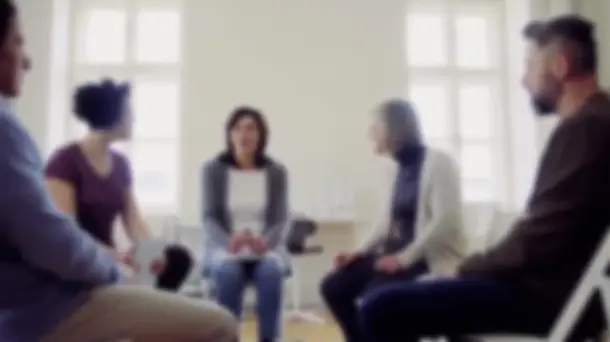Welcome to Narcotics Anonymous
What is our message? The message is that an addict, any addict, can stop using drugs, lose the desire to use, and find a new way to live. Our message is hope and the promise of freedom.

“When new members come to meetings, our sole interest is in their desire for freedom from active addiction and how we can be of help.”
It Works: How and Why, “Third Tradition”
Is NA for me?
This is a question every potential member must answer for themselves. Here are some recommended resources that may be helpful:
Need help for family or a friend?
NA meetings are run by and for addicts. If you're looking for help for a loved one, you can contact Narcotics Anonymous near you.
Subscribe to NAWS Emails
Sign up to receive Just for Today and SPAD daily meditation emails, as well as NAWS News, NAWS Updates, and more.
Never before have so many clean addicts, of their own choice and in free society, been able to meet where they please, to maintain their recovery in complete creative freedom.
Basic Text, “We Do Recover”
Recovery Quicklinks:
Service Quicklinks:
Narcotics Anonymous sprang from the Alcoholics Anonymous Program of the late 1940s, with meetings first emerging in the Los Angeles area of California, USA, in the early Fifties. The NA program started as a small US movement that has grown into one of the world's oldest and largest organizations of its type.
Today, Narcotics Anonymous is well established throughout much of the Americas, Western Europe, Australia, and New Zealand. Newly formed groups and NA communities are now scattered throughout the Indian subcontinent, Africa, East Asia, the Middle East, and Eastern Europe. Narcotics Anonymous books and information pamphlets are currently available in 49 languages.
Information About NA
Daily Meditations
Just for Today
February 27, 2026 |
“Pure” motives |
| Page 59 |
| “We examine our actions, reactions, and motives. We often find that we've been doing better than we've been feeling.“ |
| Basic Text, p. 43 |
| Imagine a daily meditation book with this kind of message: “When you wake up in the morning, before you rise from your bed, take a moment for reflection. Lie back, gather your thoughts, and consider your plans for the day. One by one, review the motives behind those plans. If your motives are not entirely pure, roll over and go back to sleep.” Nonsense, isn't it? No matter how long we've been clean, almost all of us have mixed motives behind almost everything we do. However, that's no reason to put our lives on hold. We don't have to wait for our motives to become perfectly pure before we can start living our recovery. As the program works its way into our lives, we begin acting less frequently on our more questionable motives. We regularly examine ourselves, and we talk with our sponsor about what we find. We pray for knowledge of our Higher Power's will for us, and we seek the power to act on the knowledge we're given. The result? We don't get perfect, but we do get better. We've begun working a spiritual program. We won't ever become spiritual giants. But if we look at ourselves realistically, we'll probably realize that we've been doing better than we've been feeling. |
| Just for Today: I will examine myself realistically. I will seek the power to act on my best motives, and not to act on my worst. |
A Spiritual Principle a Day
February 27, 2026 |
Powerlessness Opens the Door |
| Page 59 |
| “When we admit our powerlessness and our inability to manage our own lives, we open the door to recovery.“ |
| Basic Text, Chapter 4, “Step One” |
| Practicing powerlessness as a spiritual principle may seem far-fetched to many of us. Admitting defeat is a concept we're very uncomfortable with. But what's ironic is that we're already practicing powerlessness to some extent by attending our first NA meeting. And, even before that, very likely we've had our moments of crying out to something to stop this madness, this pain, begging to get well, pleading to finally get to sleep, fearing the sun coming up or going down again, promising and bargaining another time, the last time, we swear it! The surrender of Step One is often terrifying for us because it's a threshold we can't easily back away from once we make ourselves truly vulnerable to it. Try as some of us might, we can't put the toothpaste back in the tube: We can't return to using and just forget that people like us are staying clean in NA. We admit that we're addicts, that we're powerless over our addiction, and that we cannot manage our own lives. We need power to survive, and we gain it with the help of other recovering addicts, a program, and a Higher Power. Practicing powerlessness is not a one-time occurrence; we are faced with embracing it over and over again. “No, we get to do it over and over,” a member reminds us from the podium. “I used to feel so defeated by my powerlessness. But now that I have experienced some relief from active addiction and the benefits of getting this honest about my life, I see it as a source of strength and possibility: the possibility of recovery and a better life.” Yes, we open the door to recovery. On some days, that door is flung wide open because we are wide open. On other days we can only muster a crack to let a bit of willingness flow out and our Higher Power flow in. |
| ——— ——— ——— ——— ——— |
| It's a relief to admit I'm powerless over my addiction–in whatever form it takes. I'll ask for help because my real power comes when I surrender. |
Do you need help with a drug problem?
“If you’re new to NA or planning to go to a Narcotics Anonymous meeting for the first time, it might be nice to know a little bit about what happens in our meetings. The information here is meant to give you an understanding of what we do when we come together to share recovery…”
Subscribe to NAWS Emails
Sign up to receive NAWS Updates and NAWS News emails as well as Just for Today and SPAD daily emails.



